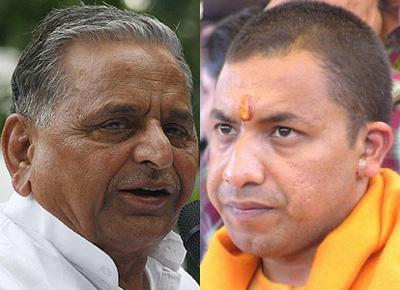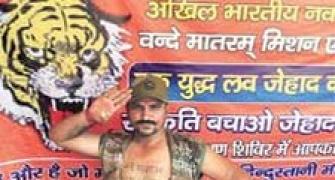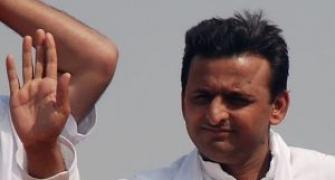 With the Bahujan Samaj Party keeping out and the Congress being in the fray only for namesake, Saturday’s by-election for 11 state assembly constituencies and for one Lok Sabha seat will determine the supremacy between Samajwadi Party and the Bharatiya
With the Bahujan Samaj Party keeping out and the Congress being in the fray only for namesake, Saturday’s by-election for 11 state assembly constituencies and for one Lok Sabha seat will determine the supremacy between Samajwadi Party and the Bharatiya
Janata Party in Uttar Pradesh.
Both political players have left no stone unturned to establish their superiority in the country’s most populous state, where the BJP had swept the last Lok Sabha poll by bagging 73 of the state’s 80 seats. But for the Mainpuri Lok Sabha seat that was vacated by SP supremo Mulayam Singh Yadav, who had won two LS seats, each of the 11 state assembly seats were held by the BJP. Sure enough it was no mean task for either of the two parties to retain all that was theirs. And that seemed to be their key worry.
Evidently, it was a bigger call for the BJP, which could not afford to lose even one of the 11 seats for that would be automatically construed as a fall in Prime Minister Narendra Modi’s graph. After all, it was the Modi magic that led the BJP to an unprecedented victory three months back. As for the SP, it just could not afford to lose Mulayam’s personal seat, where the SP president had fielded none other than a member of his own family -- his grand nephew Tejpal Singh.
Desperation has been visible in both camps over the past three weeks since the election campaign was launched. The politics of communal polarisation was played blatantly by the campaigners, particularly Yogi Adityanath, who was entrusted with the leadership of the BJP campaign. If insiders are to be believed, Adityanath was hand-picked by none other than the new BJP chief Amit Shah, who is believed to have masterminded the aggressive Hindutva theme of the campaign.
Why Shah chose to revert to the hardline Hindutva is mind boggling. After all, it was just Modi’s single-handed development theme that had led the BJP to power then, why the need for raising bogeys such as ‘love-jihad’ -- repeatedly highlighted by Adityanath, the saffron clad four-term BJP member of Parliament from Gorakhpur.
Strangely, the only reason for change in the BJP strategy could be loss of confidence.
Political analysts believe that the delay in ushering ‘acche din’ -- in keeping with Modi’s poll promise -- was what had prompted Shah to give the leadership of the UP by-poll campaign to a rabid Hindu leader like Adityanath who is widely known for his rabble-rousing speeches intended at whipping up communal passions.
Others believe that the Rashtriya Swayamsevak Sangh leadership advised Shah to rekindle the Hindutva flame so that the large chunk of the floating Dalit vote could be easily won over. The BSP’s absence from the electoral scene is bound to leave Dalits free to decide which way to go -- BJP or SP?
Since Dalits were understood to have gone with the BJP in large parts of Western UP even during the Lok Sabha election, the BJP decided to move heaven and earth to ensure support of the Dalit population in each of the 12 constituencies going to poll on Saturday.
As if mere raising the pitch on Hindutva was not enough, Adityanath and company made it a point to let themselves lose to an extent that their acts of omission and commission invited police action. Charge-sheets being issued now against hate speeches delivered by Adityanath and Shah during the Lok Sabha campaign, speak volumes of the ruling SP’s intentions to polarise the Muslim vote.
Besides harping on ‘love jihad’, BJP strategists also went about training their guns repeatedly against certain Samajwadi Party policies that were essentially oriented to woo the minorities. These included the Akhilesh Yadav government’s decisions to spend Rs 300 crore on building walls around Muslim graveyards, to give a special scholarship of Rs 30,000 to every Muslim girl clearing Class X, as also to allocate 20 per cent development funds to areas with dominant Muslim population.
Repeated focus by BJP leaders on these SP policies were clearly aimed at consolidation of the Hindu vote. But in the bargain, the high pitch campaign also indirectly helped the SP gain on polarisation of Muslims, who were left with little option.
After all, the BSP was not in the contest and the Congress remained down in the dumps to attract even a fringe of the Muslim vote.








